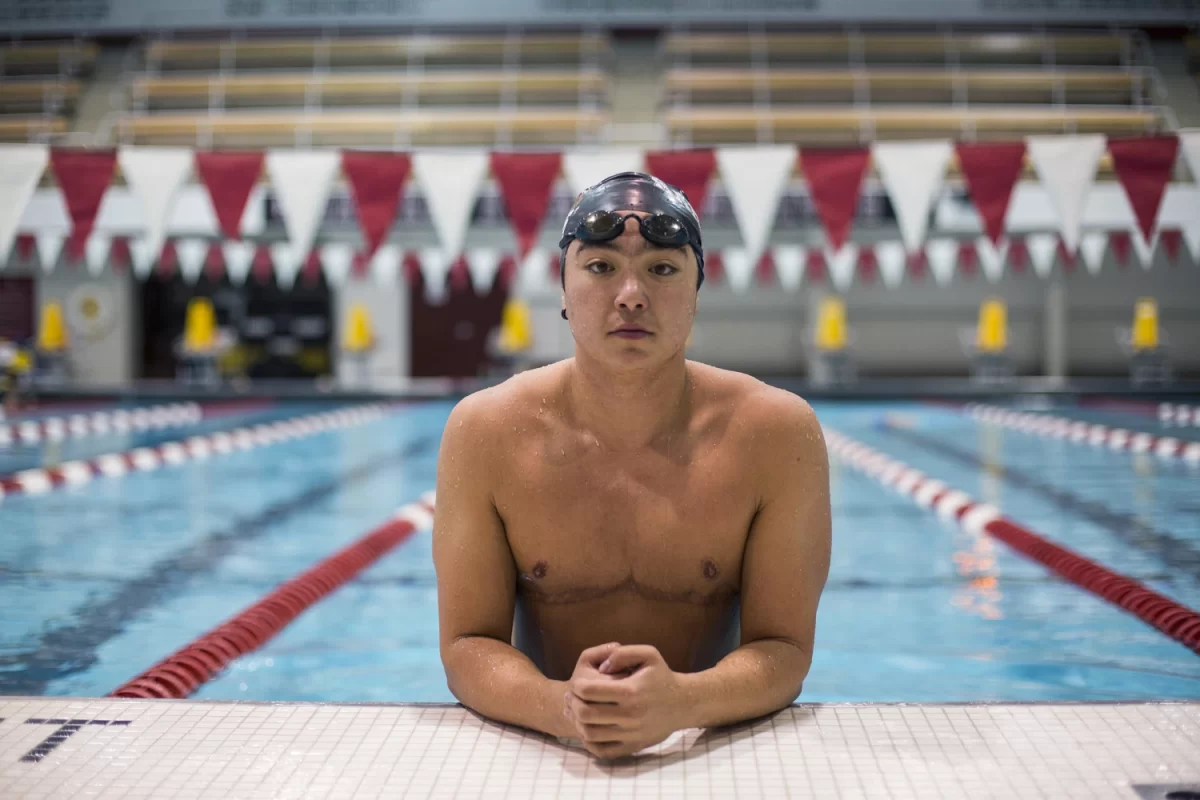Among the plethora of polarized political problems in the United States, one of the most infamous debates in the country currently is the argument regarding transgender individuals in athletics. An upsurge of articles, news stories and angry facebook posts has been seen in the past few years regarding the argument and all the passionate opinions that come with it.
Schuyler Bailar was the first openly transgender swimmer on a NCAA Division 1 swimming team and was also the first openly transgender man to compete as a man in any sport. On Tuesday, Sept. 12, Bailar visited Winona State University to speak at the first Expanding Perspectives event of the year.
To start off his speech, Bailar went through a variety of his old childhood photos, all encompassing the more “masculine” outfits and haircuts he presented even as a young child. Bailar started swimming before he turned one and was swimming competitively by age seven. He qualified for national level competition by the time he turned thirteen and was ranked in the top 20 15-year-old breast-stroke swimmers in the United States just two years later.
“I just never saw myself being like the other girls, and I saw myself being like the other boys,” Bailar stated in a 2017 interview. “But then I had this sort of wall that was like ‘but I’m not. But I can’t be. But when I grow up, I’m going to have to be a woman;’ and that terrified me.”
Throughout these years and into his late teens, Bailar struggled with issues regarding self-esteem, body image insecurities, self-harm and disordered eating. Due to these struggles, Bailar decided to take a gap year between his high-school graduation and his freshman year at Harvard University.
During this gap year, Bailar went to an inpatient rehabilitation facility for five months. His time in therapy led him to the realization that the stem of all of his mental health struggles was regarding his gender identity; after years of feeling like something was “off” and that the label of “girl” didn’t fit, Bailar realized he was transgender. When he called his Harvard swim coach to communicate his concerns, he was met with an unexpected fortunate response.
“[I said] ‘I think I’m transgender and I don’t know what it means,’” Bailar recounted. “‘I only know that I wanna keep swimming.’ And she said to me, ‘Skyler, we recruited you. We love you, the team loves you, I love you; if you wanna swim, you have a spot on this team.’”
The realization that you may be transgender is difficult for anyone to grasp; everyone’s coming-out story looks different, but the process of coming-out to family and friends is not only very anxiety-inducing but sometimes a matter of safety for the person coming out. Bailar stated that the process of transitioning brought about many difficulties in everyday life, including which bathrooms to use, feeling like an outcast in both boys and girls groups and correcting misconceptions regarding the transition process.
On top of the everyday difficulties that came with coming out, Bailar had to conquer one of the most difficult decisions of his life. After Bailar called his Harvard swim coach to tell her that he is transgender, he was presented with two options: continue to swim on the women’s swim team, the team he had been training for his whole career, or swim on the men’s team, where he could be his true self.
“I [had] been working for years, and 131 days in the treatment center to be myself, to be honest, to be authentic, and to be happy, most importantly, but that’s a huge risk,” Bailar said. “It’s a huge risk to just be happy, or even take a step that might make you happy.”
Schuyler Bailar became the first openly trangender man to compete on a men’s team in any sport in 2015. After finishing in the top 13% in breaststroke and in the top 15% in butterfly in his four years at Harvard, Bailar began to use his platform to discuss and confront anti-trans legislation seeking to ban transgender individuals from competing on sports teams.
One of the biggest pieces of advice Bailar gave to the audience is the idea that transphobia is not the transgender person’s fault, but the transphobic person’s issue. For example, when Bailar found himself in a relationship with someone with transphobic opinions, he blamed himself for her negative feelings towards him.
This ideology can be applied to any type of phobia or -ism – for example, homophobia, racism, transphobia, etc. Being discriminated against is not the minority’s or the victim’s fault; it is the other person’s prejudice coming through their discriminatory actions.
Josie Strutz, a term 4 nursing major who attended the event, reflected on the positive impact of Bailar through his story and subsequent reflection on today’s political environment regarding the debate of trans-athletes on sports teams.
“As athletes who identify as transgender rise in the media, as if it’s up for debate, I felt this event was a phenomenal way to hear from someone who has been subject to that personally,” Strutz said. “Schuyler addressed the audience in a way that was open to education–without judgment–and showed great strength and empowerment in the transgender community.”
Among his various projects, Bailar is releasing his second individually-written book called “He/She/They” on Oct. 16 of this year. The book is described on his website to be “a wonderfully clear and convincing guide to comprehending and defending gender diversity.” Bailar previously published his first novel “Obie is Man Enough,” a fictional story about a biracial transgender boy who enjoys competitive swimming but has a transphobic coach; the story follows his worries about proving himself to be “man-enough.”
“This is for all the trans kids out there wondering if you belong. You do. You absolutely do,” Bailar states in his instagram post announcing the release of the novel.
Schuyler Bailar is a wonderful example of perseverance, strength and acceptance. From being the first openly transgender man on a NCAA Division 1 swimming team to coming out to his catholic immigrant grandparents, Bailar exemplifies what it means to be true to yourself despite the world telling you not to.
“I really want people to know that they can be who they are and do what they love at the same time,” Bailar said.

































